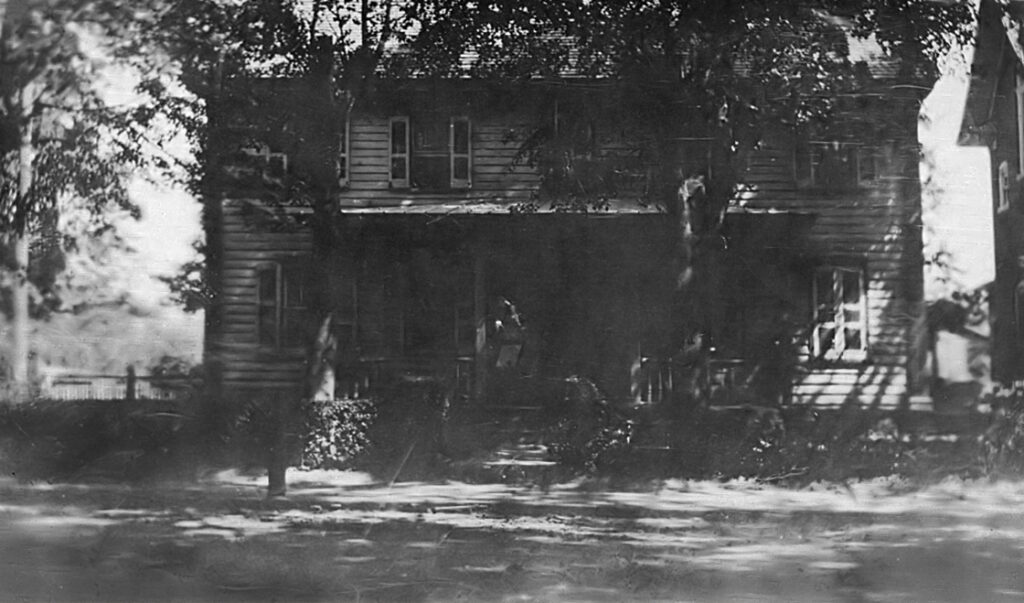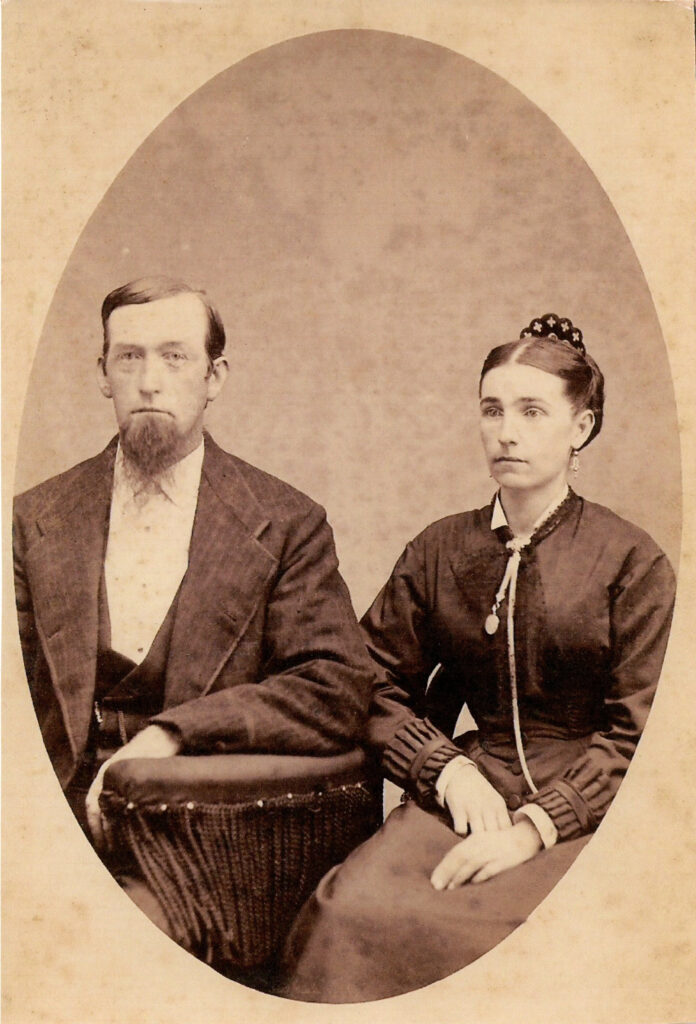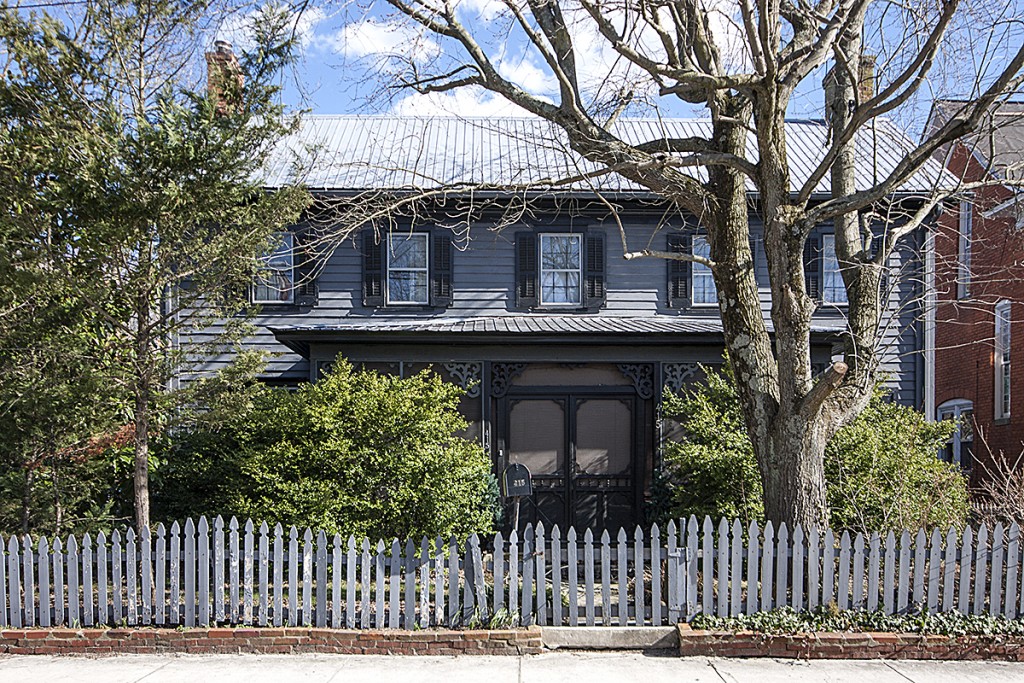In a past story about David A. Conner, Milton’s long-time correspondent for the Milford Chronicle, I included a photograph of the house he lived in: 415 Federal Street, on the southeast corner of Manship Street, still standing. Alfred H. Manship (1837 – 1904) is said to have built that house, and rented it to the Conner family for many years.
Alfred married Anna Eliza Barker in 1858, when she was 17 and he was 21. The children began arriving almost immediately, and Alfred found work as a carpenter to support them. On his 1863 draft registration, his occupation was listed as ship carpenter, which would make sense given that Milton’s shipbuilding industry was still at its peak at that time. According to his discharge paper, he served as a “100 Day Man” in the 9th Delaware Infantry Regiment from September 2nd, 1864 to January 23rd, 1865; the discharge also identifies him as being six feet tall, with auburn hair and blue eyes. “100 Day” men were used to garrison cities and guard rail lines, freeing up regular Union Army veterans for the 1864 campaigns. There is no documentation that can be found that attests to his having been wounded in action, but he did file for an Invalid Pension (wounded veteran pension) in 1887. In 1890, the pension was granted, perhaps because of his bouts with debilitating illnesses over the years; the qualification criteria for such a pension were becoming more and more liberal toward the end of the 19th century.

What is clear, from the 1868 Beer Atlas map of Milton, was that he already owned a house on Federal Street, on the southeast corner of the side street that bore his family name. Given that the house dates to about 1860, it may well be possible that Alfred himself built it, as a home for his new wife and child.

In March of 1873, Manship’s first wife Anna died; he married his second wife, Eliza Lindle, in October of that same year. From another contract drawn up in 1874, we know that he purchased a plot of land on Chestnut Street, but the first report we have of him building a dwelling on that street is in the December 14, 1888 edition of the Milford Chronicle. Once the Manship family moved there, he was in a position to rent his Federal Street property to David A. Conner. Coincidentally, Conner was also a 100 Day Man, but there is no chance their paths had crossed during their military service; Conner served in a different unit, the 7th Delaware Infantry Regiment, from July 12, 1864 until he was mustered out early, on August 12, 1864.
In the 1880’s and 1890’s Alfred was active fraternal organizations and in local Republican politics. He was a member of the Milton Independent Order of Odd Fellows, one of three delegates from the Broadkill Hundred to the State Republican Convention in 1894, and involved with the supervision of Milton schools. Alfred H. Manship was first appointed Milton’s postmaster on April 20, 1889, for a four year term, and he was again appointed on April 27, 1897. In 1903, he was replaced by John Black. David A. Conner writes in his column of September 4, 1903 that “Mr. Manship has had the office for several years, and the Union Republicans have been after his scalp for some time, and have succeeded in getting it.”
This last comment by David A. Conner merits further examination, because it only hints at the turmoil in the Republican Party of Delaware in the later 19th century. The Democrats, who had opposed Abraham Lincoln’s policies (but stopped short of outright secession), controlled the the state government and Federal offices from the end of the Civil War to 1898. However, the expansion of industry and the influx of immigrants in the state fueled a rise in GOP power and influence. Along with the rise in power came a parallel rise in corruption, and a division of the party into two factions: “Regular Republicans” and “Union Republicans.” The latter are most closely associated with their support of John Addicks, a candidate who unsuccessfully tried to buy a U. S. Senate seat and created an uproar in the state. Alfred H. Manship’s fortunes were tied to the Regular Republican faction of the party, which he had served faithfully for nearly two decades. By 1902, “Union Republicans” had enough clout in Sussex County to anoint their own postmaster in Milton, a much sought-after position at the time in most small towns. During Manship’s second tenure as Postmaster of Milton, “Union Republicans” mounted a smear campaign against him, accusing him of various failures in executing his duties. The campaign was strident enough to have required the Postmaster General of the U. S. to visit Milton and personally investigate the matter. Cleared of any wrongdoing and supported by most of Milton’s citizenry, he nevertheless failed to obtain a second term as Milton’s postmaster. The undeserved experience of having been maligned by political opponents and then losing a subsequent appointment is certain to have taken a heavy psychological toll on a man who had also suffered periodic debilitating illnesses.
In 1904, Alfred H. Manship took ill and died in September of that year. Conner writes in his column of September 30, 1904 that Manship “had been suffering from nervous troubles for some time. It is believed his supersession by another in the post office, hastened his death.”

Sources
Milford Chronicle, 1881 – 1904
Wilmington Evening Journal, July 21, 1902
